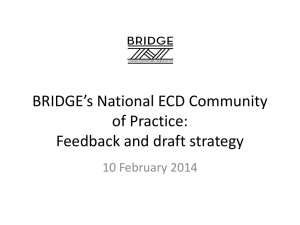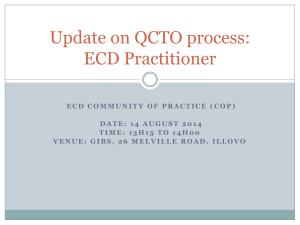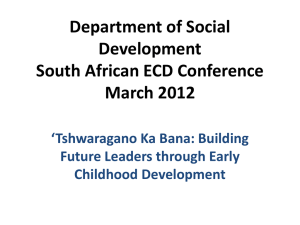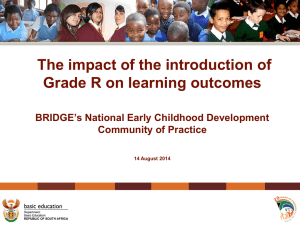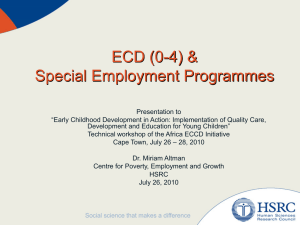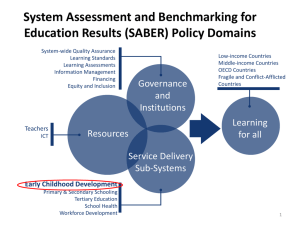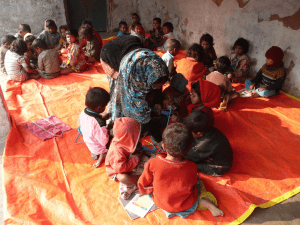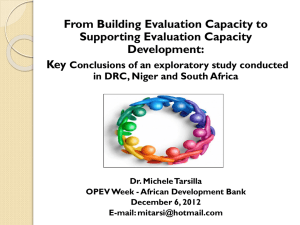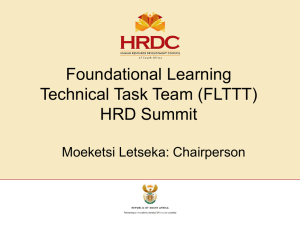DRAFT ECD CoP Principles of Engagement document
advertisement
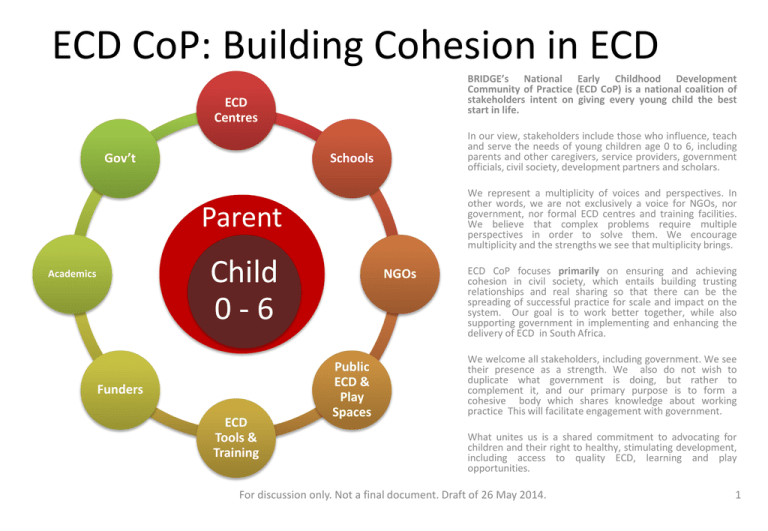
ECD CoP: Building Cohesion in ECD BRIDGE’s National Early Childhood Development Community of Practice (ECD CoP) is a national coalition of stakeholders intent on giving every young child the best start in life. ECD Centres Gov’t In our view, stakeholders include those who influence, teach and serve the needs of young children age 0 to 6, including parents and other caregivers, service providers, government officials, civil society, development partners and scholars. Schools We represent a multiplicity of voices and perspectives. In other words, we are not exclusively a voice for NGOs, nor government, nor formal ECD centres and training facilities. We believe that complex problems require multiple perspectives in order to solve them. We encourage multiplicity and the strengths we see that multiplicity brings. Parent Child 0-6 Academics Funders ECD Tools & Training NGOs Public ECD & Play Spaces ECD CoP focuses primarily on ensuring and achieving cohesion in civil society, which entails building trusting relationships and real sharing so that there can be the spreading of successful practice for scale and impact on the system. Our goal is to work better together, while also supporting government in implementing and enhancing the delivery of ECD in South Africa. We welcome all stakeholders, including government. We see their presence as a strength. We also do not wish to duplicate what government is doing, but rather to complement it, and our primary purpose is to form a cohesive body which shares knowledge about working practice This will facilitate engagement with government. What unites us is a shared commitment to advocating for children and their right to healthy, stimulating development, including access to quality ECD, learning and play opportunities. For discussion only. Not a final document. Draft of 26 May 2014. 1 ECD CoP: National and Provincial Voices The South African Early Childhood Development Community of Practice (ECD CoP) is an inclusive, umbrella body. We invite and encourage all national and provincial bodies to attend our meetings, participate, and collaborate with the ECD CoP and its members. ECD CoP We believe that, through collaboration and increased coordination, we can increase the efficiency of the provision of services to children. Local NGOs Key Provincial Champions Provincial Forum & Bodies We seek innovation and ‘newness’ in our thinking and approach so as to leverage existing capacities and knowledge. We believe bold, visionary approaches are needed to increase access and quality of early learning and ECD offerings in South Africa. Tipping Points of Influence We believe the ECD CoP can offer a new model for engagement and creating a shared vision with government, donors, civil society, development partners, practitioners and one another. For discussion only. Not a final document. Draft of 26 May 2014. 2 ECD CoP: Multi-Stakeholder by Choice The South African Early Childhood Development Community of Practice (ECD CoP) is consciously made up of a multiplicity of stakeholders, because we believe the nature of complex problems will best be addressed through a diversity of views and approaches. Multi-stakeholder forums provide a vital platform for engagement between stakeholders on issues of common interest, especially where all stakeholders are committed to the same fundamental or overarching goals, for example access to quality, integrated ECD services for all children in South Africa. No single stakeholder can achieve a goal such as this alone, so it necessarily requires coordination, collaboration and cooperation. We believe all stakeholders add value to the whole through their diverse knowledge, expertise, spheres of influence etc. and this facilitates sharing of best practice, innovation and more effective action towards a common goal than would be achieved by each working alone. Within a community of practice there will necessarily be power differentials and there will be issues on which different stakeholders agree and disagree. Such a forum can be a place for dialogue and debate and reaching a richer and more common understanding, which at times may lead to collective positive action. It will, however, not always be possible to reach consensus and this is where the issue of a formal mandate for the multi-stakeholder forum to speak on behalf of all its members becomes challenging. We believe this does not undermine the value of a multi-stakeholder forum, it simply means that the role it plays will be different from a single-stakeholder forum. For this reason, we actively seek to collaborate with other forums, including single-stakeholder forums at a provincial level. We believe that through open communication and a spirit of collaboration and abundance, (rather than competition), we will be better able to serve the needs and improve the lives of young children in South Africa. For discussion only. Not a final document. Draft of 26 May 2014. 3 When and how do we decide to speak with a collective voice? Because we are a diverse group of stakeholders, we understand that we cannot always speak with one unified voice. Our own areas of interest, passion and experience mean that we will often bring unique perspectives on what we believe is in the best interest of South Africa’s young children. However, there will be times when some or all of us see an opportunity to comment with a collective voice on policies, programmes, curriculum, budget or other matters likely to affect young children. Given that we come from so many different areas, how does the ECD CoP ratify comments, endorse policy, or otherwise speak as a collective? 1. We recommend that we research some global best-practice methods for multi-stakeholder decision making. 2. Until we decide on a formal process for official comments and endorsements, we recommend that when ECD CoP members believe there is a strong case for speaking with one unified voice, such as on the recent QCTO issue, that ECD CoP members passionate about the issue submit a request for comments to the ECD CoP via BRIDGE, first asking: a. Putting children at the centre, and considering the multi-stakeholder nature of the ECD CoP, should the ECD CoP really comment on this issue? Or should we comment as individual institutions or in another collective? b. If we do believe the ECD CoP should comment on this issue, and again putting children at the centre, how do we endeavor to create and phrase comments that can be ratified by a majority of ECD CoP members, across sectors and provinces, and include dissenting voices in our comment, where appropriate? This process might include a request for voluntary comments and feedback from all ECD CoP members to be submitted to a task team or working group on that specific issue. This task team or working group would then collect and collate all the comments and consolidate them, including dissenting views where appropriate. This unified comment could then be presented to the ECD CoP at meetings in different provinces and online. There would then be a process of endorsement or ratification by the ECD CoP – still to be determined. Given sufficient consensus, working groups would be authorized to act on behalf of the CoP. The values and guiding principles, and the multi-stakeholder nature of the ECD CoP, should be considered throughout this process. For discussion only. Not a final document. Draft of 26 May 2014. 4 ECD CoP: Values and guiding principles Values • • • • • • • • • • • • • Child-centredness Respect Mutual support Accountability Integrity Professionalism Openness Innovation Ubuntu Transformation Collaboration Methodological approach Self-organising Principles • Every child in South Africa is born in equal value and dignity, and deserves the best possible start in life • We come together to help every child get that best start in life. We do this by learning, networking, sharing ideas and innovating, so that we might better serve South Africa’s young children through quality ECD opportunities • We seek to incorporate the unique perspectives of our diverse stakeholders across provinces • We are proudly South African, and seek to promote both local and international best practice in ECD • We seek to innovate, create and make things happen For discussion only. Not a final document. Draft of 26 May 2014. 5 Some areas of practice and passion ECD Centres • Vibrancy • Sustainability • Registration • Subsidies • Quality in every centre • Improving access for all • Upskilling, formalising, supporting home-based creches and informal centres Public ECD/Play Spaces Training of ECD Practitioners • ECD also exists outside of ECD centres • Safe, childcentred public play areas • Public campaigns about the importance of ECD, parent involvement • What quality QTCO Level 4, Level 5 looks like • Link between occupational/ professional training • Follow-up after training • Ensuring quality in classrooms ECD Curriculum Special Needs • Appropriate • Creating the South Africa we dream of • Specific approaches, e.g. Reggio Emilia, Montessori • Promote best practices in SA • Early identification of special needs • Advocacy • Inclusion in mainstream centres and public spaces • Parent support For discussion only. Not a final document. Draft of 26 May 2014. Government Engagement • National • Provincial • Municipal • Local • Commitment • Collaboration • Unlocking funds • Sharing information: ECD--> Gov't Gov't-->ECD Parents • Parents' needs in different segments? • How can we get all parents more involved? • What does ideal parent support look like? • What drives parent involvement? • Celebrate what works 6
